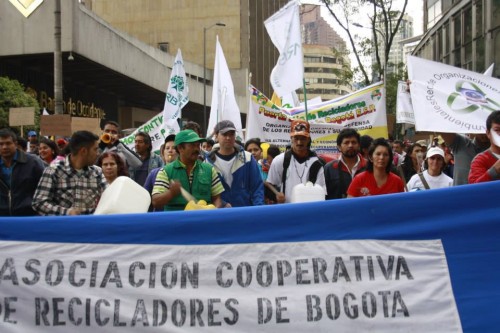Posted by International Alliance of Waste Pickers
Written by Asociación de Recicladores de Bogotá (ARB)
Region Latin America
Country Colombia
March 02, 2015
March on March 3 at 8 am from the Plaza de Toros to Plaza de Bolívar in Bogotá, Colombia
International Mobilizations
Why are we marching rather than celebrating? Because we do not celebrate death…and the death of so many waste pickers at the hands of criminals, whether accidents at dumps and landfills or in the streets, cannot be sacrifices in vain!
The Colombian waste pickers, along with the waste pickers around the world, have worked hard for decades in a profession that provides a great service to all of humanity and the environment, but continue to go unrecognized by society and its leaders.
We are treated unfairly, despite multiple declarations that demand the recognition of the existence of millions of waste pickers, who collect millions of recyclable materials, that make possible a value chain that produces jobs and makes it so that 20 million waste pickers in the world bring bread to the table every single day, supporting their families.
This livelihood continues to be persecuted by the authorities and taken over by large private companies, without any concern about their way of supporting their families. They have a right to keep their livelihood, be part of the value chain and receive just payment as part of the formal system of waste management in cities.
But the waste pickers, their families, and organizations are the first to defend their livelihood, to value their successes and recognize the challenges that the union faces with the changing of political leadership and waste management plans and policies…the waste pickers, who guarantee the end of a model of waste management that depends on burying waste and landfills and are moving towards zero waste models that recognize the waste pickers as the natural service providers and who promote the value chain.
This kind of recognition does not come with petitions but comes with the mobilizations of workers that seek dignified living conditions and livelihoods… and recognition comes when the community shows its support for and solidarity with the waste pickers that demand their recognition in the streets.
And it’s from the streets that waste pickers organize and not in auditoriums where the public — who are also impacted by waste management policies, without knowing they have a present and future responsibility in it — cannot even go.
Towards waste management modles that permit waste pickers to keep their livelihoods, that provide just payment towards that service, and the growth of this value chain.
We march! We reclaim true solidarity!
Tweet


